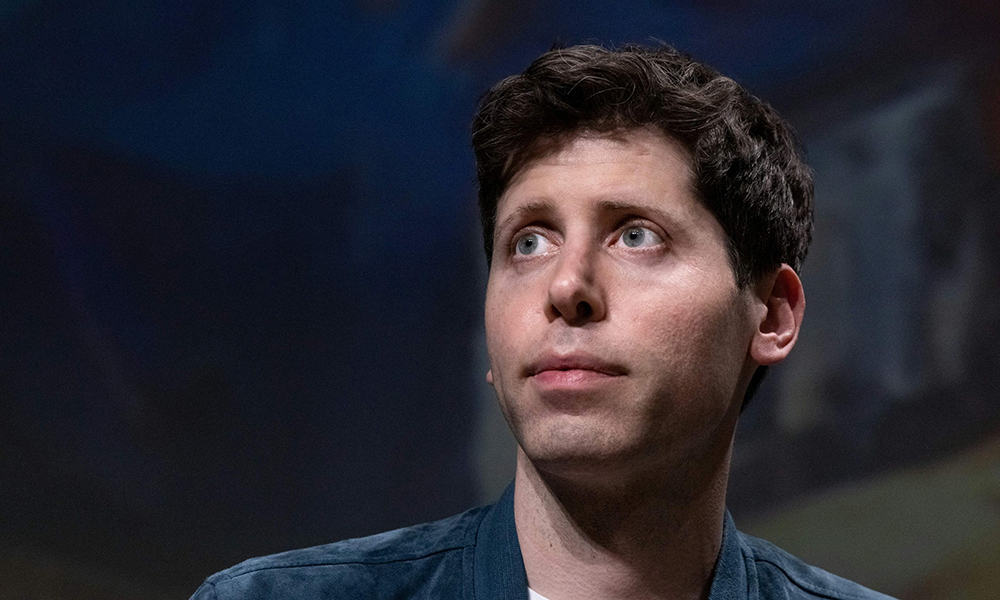
Worldcoin是近年来最大胆的项目之一。这家诞生于科幻电影的公司承诺,人们只要用未来感十足的球体扫描眼球,就可以获得加密货币作为奖励。这些扫描结果将用于证明人们的“人类身份”,正如该项目所描述的那样:在日益被人工智能主导的人类社会,这将是一项宝贵的资产。
经过三年试验,这款名为世界币的加密货币在周一上线,空投给通过球体认证的用户。过去三年,媒体围绕Worldcoin雄心勃勃的目标、致命缺陷和稀奇古怪的理念展开报道。其他用户可以下载该公司的应用,在使用球体认证后获得世界币,包括参加未来的空投,但世界币的发行仅限于特定国家。例如,在美国,由于监管不确定性,用户没有资格获得世界币。
Worldcoin由山姆·阿尔特曼和马克斯·诺文德斯特恩于2020年共同创立。阿尔特曼现在凭借ChatGPT开发者OpenAI公司而闻名。诺文德斯特恩则正在从事另外一个以人工智能为主的投资项目。目前Worldcoin的主要管理者是前理论物理学博士生亚历克斯·布兰尼亚。他目前担任Tools for Humanity的CEO。该公司负责开发世界币,直至其实现完全去中心化的目标为止。
Worldcoin初期的业务重心是其加密货币。用户在Worldcoin专属的球体上进行眼球扫描验证其“人类身份”后,可以获得即将发行的世界币作为报酬。Worldcoin的理念是构建一个体系,使全世界每个人都能参与财务分配模型,而世界币将成为这个体系的主要货币,并通过“全民基本工资”项目进行分配。
该公司成立后前两年遭遇了诸多障碍,布兰尼亚将其归咎于标准Beta测试。媒体报道指出,该项目雇佣承包商使用球体收集人们的虹膜数据是草率之举,违反了隐私保护法,并且面临腐败指控。而Worldcoin则坚称,其专门创建的协议可以通过一个复杂的密码技术模型保护人们的生物统计数据。
在代币发行的同时,Worldcoin已经将其协议迁移到在以太坊上开发的二层区块链Optimism主网。Tools for Humanity还发布了一份世界币白皮书。
“一个截然不同的世界”
自11月ChatGPT发布以来,随着公众对生成式人工智能及其对就业和在线身份的潜在威胁日益了解,Worldcoin开始强调其“人类身份凭证”体系具备避免这些问题的独特能力。Tools for Humanity开发了一款软件开发套装,使其他应用可以使用人们的数字身份World ID,以取代电子邮箱和密码等其他登录认证方式。用户通过球体认证后会生成一个World ID。布兰尼亚和他的工程师团队表示,Worldcoin的虹膜扫描协议是创建全球身份认证体系唯一通用的方法,而世界币将作为获取用户的激励机制。
随着世界币上线,Worldcoin进入了一个新阶段。目前该公司仅投放了150个球体,只有200万人注册该平台,远未达到Worldcoin产生有效的网络效应所需要的数亿甚至数十亿用户的目标。布兰尼亚在接受《财富》杂志采访时表示,世界币上线可能吸引更多人对其产生兴趣,Worldcoin希望到年底投入使用的球体达到1,500台,并开拓更多新市场。
他说道:“大众注册该平台的兴趣将比目前高出两个数量级。它将产生明确的价值,我认为那将是一个任何人都无法预测的截然不同的世界。”
世界币上线的直接影响尚不明确。Worldcoin没有选择在Coinbase或Uniswap等交易平台上直接发行世界币,而是选择向用户空投,用户可通过加密货币钱包使用世界币进行交易。据知情人士在3月对《财富》杂志表示,约70%的世界币将分配给注册用户,剩余的世界币将分配给内部人士,如Tools for Humanity的员工和公司的投资者等。
但交易平台不可避免地会开始交易世界币,这会形成一个由法定货币驱动的市场,这意味着世界币将具有现实世界的价值。这可能引发世界币欺诈的问题,例如已经有记录显示有人卖掉了自己的身份认证,使其他人可以获得空投的世界币。布兰尼亚表示,Worldcoin正在开发相关措施,使人们可以收回和重新验证其身份认证。
他对《财富》杂志表示:“每一个身份认证体系都会存在欺诈现象。这实际上并不是体系本身的问题。”(财富中文网)
翻译:刘进龙
审校:汪皓
Worldcoin是近年来最大胆的项目之一。这家诞生于科幻电影的公司承诺,人们只要用未来感十足的球体扫描眼球,就可以获得加密货币作为奖励。这些扫描结果将用于证明人们的“人类身份”,正如该项目所描述的那样:在日益被人工智能主导的人类社会,这将是一项宝贵的资产。
经过三年试验,这款名为世界币的加密货币在周一上线,空投给通过球体认证的用户。过去三年,媒体围绕Worldcoin雄心勃勃的目标、致命缺陷和稀奇古怪的理念展开报道。其他用户可以下载该公司的应用,在使用球体认证后获得世界币,包括参加未来的空投,但世界币的发行仅限于特定国家。例如,在美国,由于监管不确定性,用户没有资格获得世界币。
Worldcoin由山姆·阿尔特曼和马克斯·诺文德斯特恩于2020年共同创立。阿尔特曼现在凭借ChatGPT开发者OpenAI公司而闻名。诺文德斯特恩则正在从事另外一个以人工智能为主的投资项目。目前Worldcoin的主要管理者是前理论物理学博士生亚历克斯·布兰尼亚。他目前担任Tools for Humanity的CEO。该公司负责开发世界币,直至其实现完全去中心化的目标为止。
Worldcoin初期的业务重心是其加密货币。用户在Worldcoin专属的球体上进行眼球扫描验证其“人类身份”后,可以获得即将发行的世界币作为报酬。Worldcoin的理念是构建一个体系,使全世界每个人都能参与财务分配模型,而世界币将成为这个体系的主要货币,并通过“全民基本工资”项目进行分配。
该公司成立后前两年遭遇了诸多障碍,布兰尼亚将其归咎于标准Beta测试。媒体报道指出,该项目雇佣承包商使用球体收集人们的虹膜数据是草率之举,违反了隐私保护法,并且面临腐败指控。而Worldcoin则坚称,其专门创建的协议可以通过一个复杂的密码技术模型保护人们的生物统计数据。
在代币发行的同时,Worldcoin已经将其协议迁移到在以太坊上开发的二层区块链Optimism主网。Tools for Humanity还发布了一份世界币白皮书。
“一个截然不同的世界”
自11月ChatGPT发布以来,随着公众对生成式人工智能及其对就业和在线身份的潜在威胁日益了解,Worldcoin开始强调其“人类身份凭证”体系具备避免这些问题的独特能力。Tools for Humanity开发了一款软件开发套装,使其他应用可以使用人们的数字身份World ID,以取代电子邮箱和密码等其他登录认证方式。用户通过球体认证后会生成一个World ID。布兰尼亚和他的工程师团队表示,Worldcoin的虹膜扫描协议是创建全球身份认证体系唯一通用的方法,而世界币将作为获取用户的激励机制。
随着世界币上线,Worldcoin进入了一个新阶段。目前该公司仅投放了150个球体,只有200万人注册该平台,远未达到Worldcoin产生有效的网络效应所需要的数亿甚至数十亿用户的目标。布兰尼亚在接受《财富》杂志采访时表示,世界币上线可能吸引更多人对其产生兴趣,Worldcoin希望到年底投入使用的球体达到1,500台,并开拓更多新市场。
他说道:“大众注册该平台的兴趣将比目前高出两个数量级。它将产生明确的价值,我认为那将是一个任何人都无法预测的截然不同的世界。”
世界币上线的直接影响尚不明确。Worldcoin没有选择在Coinbase或Uniswap等交易平台上直接发行世界币,而是选择向用户空投,用户可通过加密货币钱包使用世界币进行交易。据知情人士在3月对《财富》杂志表示,约70%的世界币将分配给注册用户,剩余的世界币将分配给内部人士,如Tools for Humanity的员工和公司的投资者等。
但交易平台不可避免地会开始交易世界币,这会形成一个由法定货币驱动的市场,这意味着世界币将具有现实世界的价值。这可能引发世界币欺诈的问题,例如已经有记录显示有人卖掉了自己的身份认证,使其他人可以获得空投的世界币。布兰尼亚表示,Worldcoin正在开发相关措施,使人们可以收回和重新验证其身份认证。
他对《财富》杂志表示:“每一个身份认证体系都会存在欺诈现象。这实际上并不是体系本身的问题。”(财富中文网)
翻译:刘进龙
审校:汪皓
Worldcoin is one of the most audacious projects in recent memory—a company directly out of a sci-fi movie, with a promise to gift individuals crypto tokens if they scan their eyeballs using a futuristic orb. Those scans can be used to prove people’s “humanness,” as the project describes it: a valuable asset in a society increasingly dominated by artificial intelligence.
After three years of trials, with headlines fixating on Worldcoin’s ambitious hopes, fatal flaws, and straight-up weirdness, the token—also named Worldcoin—is launching on Monday through an airdrop to users who have been verified through an orb. Other users can secure their tokens by downloading the company’s app until they get access to an orb, including for future airdrops, although the token distribution will be limited to certain countries. Users in the U.S., for example, are not eligible to receive the tokens amid regulatory uncertainty.
Worldcoin was founded in 2020 by Sam Altman, now known for his work with the ChatGPT developer OpenAI, and Max Novendstern, who is now working on a separate A.I.-focused investment project. The main player currently behind Worldcoin is Alex Blania, a former Ph.D. student in theoretical physics who now serves as the CEO of Tools for Humanity, the parent organization developing Worldcoin until it achieves its goal of full decentralization.
Worldcoin’s early days focused on its crypto token. By verifying “personhood” through an eye scan on its proprietary orb, users would receive the as-of-yet-launched Worldcoin tokens as rewards. The idea was that Worldcoin could create a system whereby every global individual would be onboarded into a financial distribution model where the token could become a central form of currency and be distributed through “universal basic income” programs.
The company’s first couple of years were defined by obstacles, which Blania attributed to standard beta testing. Media coverage highlighted the project’s slipshod way of using contractors to capture people’s iris data with its orbs, as well as privacy law violations and allegations of corruption. Worldcoin, meanwhile, insisted that it was creating a special protocol that safeguarded people’s biometric data through a complicated model of cryptographic techniques.
As part of the token launch, Worldcoin has migrated its protocol to the Optimism mainnet, a layer-2 blockchain built on Ethereum. Tools for Humanity is also releasing a Worldcoin white paper.
‘An entirely different world’
Since the November launch of ChatGPT and growing public awareness of generative A.I.—and the potential threats to employment and online identity—Worldcoin began emphasizing its “proof of personhood” system as uniquely capable of countering those concerns. Tools for Humanity developed a software development kit, or SDK, where other apps could use people’s World ID—generated after they are verified by an orb—in lieu of other login credentials, like emails and passwords. Blania and his team of engineers said Worldcoin’s protocol of iris scans was the only universal way to create a global identity verification system, with the token serving as an incentive mechanism to acquire users.
With the launch of the token, Worldcoin enters a new phase. Currently, only around 150 orbs are operational, and just 2 million people have signed up to the platform—a far cry from the hundreds of millions, or billions, that Worldcoin needs to create meaningful network effects. In an interview with Fortune, Blania said Worldcoin hopes to have 1,500 orbs operational by the end of the year, as well as expand to new markets, with the launch of the token likely driving more interest for signups.
“General interest is probably going to be two orders of magnitude higher than it is now,” he said. “There’s going to be a defined value attached to it—it’s just going to be an entirely different world that I think none of us can actually predict.”
The immediate impact of the token launch is unclear. Worldcoin is not launching its token directly on exchanges like Coinbase or Uniswap, instead airdropping it to users, who will be able to transact with it through crypto wallets. A person familiar with the matter told Fortune in March that around 70% of overall tokens will go to registrants, with the rest going to insiders such as Tools for Humanity employees and the firm’s investors.
But exchanges inevitably will begin to list it, which will create a fiat-driven market, meaning Worldcoin will have a real-world value. While this could create potential fraud issues for Worldcoin, such as already documented instances of people selling their credentials so that others could receive their airdropped tokens, Blania said that Worldcoin is developing ways for people to recover and reauthenticate their credentials.
“Every identity system has frauds,” he told Fortune. “It’s not an actual concern for the system itself.”






